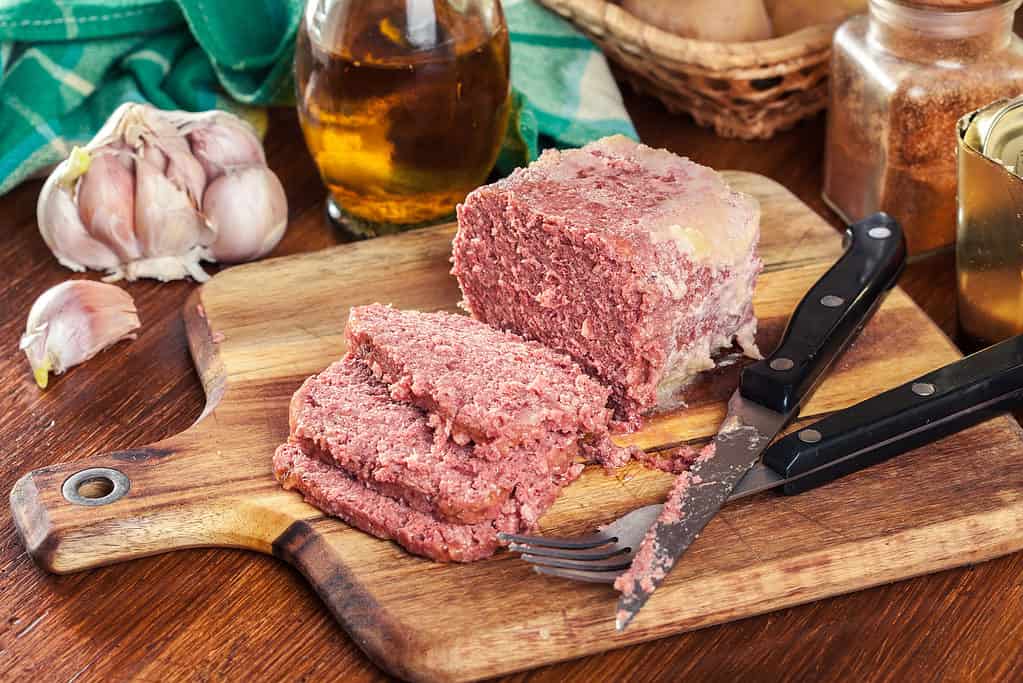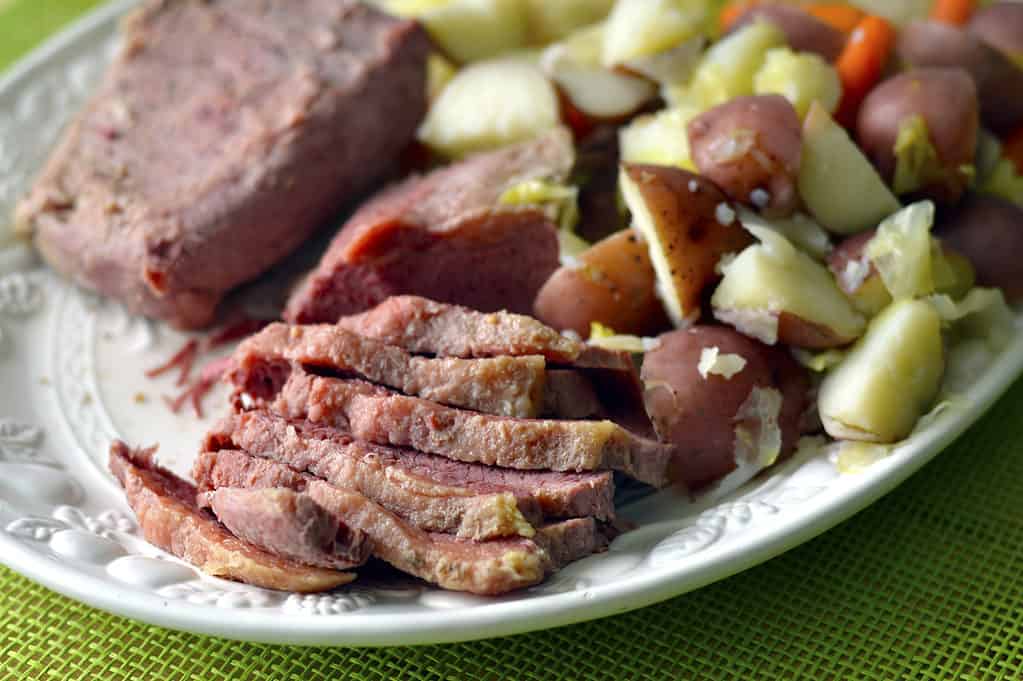It’s easy to think that all meat must be safe for dogs. After all, meat is a primary part of their diet.
However, this isn’t completely true. While many plain meats, such as beef, are good for dogs, they aren’t as healthy once they’ve been prepared for humans because we add seasonings, salt, and other unhealthy ingredients.
This article will discuss why dogs can’t eat corned beef, what to do if your dog eats it, and more.
Is Corned Beef Safe for Dogs?

Corned beef contains large amounts of fat and salt, which can make dogs very sick.
©iStock.com/fotek
Corned beef is not safe for dogs. While it’s not toxic, it contains large amounts of fat and salt, which can make your dog very sick.
Below, we’ll go over the risks of corned beef one by one to help you understand why you should never feed this meat to your dog.
Salt Poisoning
Although dogs need salt in their diets, they don’t need excess salt apart from what they get in their dog food. Too much salt can result in salt poisoning.
Symptoms of salt poisoning include:
- Vomiting
- Diarrhea
- Decreased appetite
- Weakness
- Lethargy
- Lack of coordination
- Excessive thirst or urination, or dehydration
- Tremors
- Seizures
- Coma
In extreme cases, salt poisoning can kill a dog. If you notice the symptoms above, get your dog to the vet immediately. Call an emergency clinic if your primary vet is unavailable.
Pancreatitis
Pancreatitis is when a dog’s pancreas becomes inflamed. Though it can be caused by various things, one way a dog gets pancreatitis is by eating foods high in fat.
This causes symptoms like:
- Excessive vomiting
- Large amounts of diarrhea
- Poor appetite
- Increased thirst
- Lethargy or depression
- Intense pain
Pancreatitis is a severe condition, and it’s vital that you get your dog to the emergency vet if you notice symptoms. Especially when left untreated, pancreatitis can be deadly.
Gastroenteritis
Gastroenteritis is when a dog’s gut becomes inflamed. Like pancreatitis, gastroenteritis is an emergency.
Symptoms of gastroenteritis include:
- Episodes of vomiting or diarrhea (vomit may contain foamy yellow bile)
- Heaving or gagging after eating or drinking
- Abdominal pain
- Lethargy
- Decreased appetite
- Fever
As you can see, the symptoms of gastroenteritis and pancreatitis are very similar. When you see these symptoms at home, the important thing is to get to a veterinarian as soon as possible.
Avoid visiting an emergency clinic if your primary vet is unavailable.
Your veterinarian will likely order an ultrasound, alongside other tests, to make an accurate diagnosis for either pancreatitis or gastroenteritis.
Toxic Seasonings
Another concern, apart from the corned beef itself, is that it may contain seasonings that make it toxic for dogs.
If this is the case, please call your local emergency vet clinic or a pet poison hotline for help.
What To Do if Your Dog Eats Corned Beef

A small amount of corned beef will likely be okay for your dog.
©iStock.com/Basya555
If your dog eats a small amount of corned beef, it will likely be okay. However, it’s best to call your veterinarian (or an emergency clinic, if the vet is unavailable) to be sure. Let the clinic know how much your dog ate, the ingredients, and if it’s showing any symptoms of stomach upset or any of the conditions listed above.
Your veterinarian might want to see your dog right away or have you monitor the situation at home.
Be sure to monitor your dog for the next few days. Look for the conditions listed above, and rush to the vet if you see symptoms of salt poisoning, pancreatitis, or gastroenteritis.
If your primary veterinarian cannot see your dog today or is closed when symptoms present, call the nearest emergency vet clinic for help. Waiting could cost your dog its life!
Can Dogs Eat Canned Beef?
Most of the time, canned beef will contain too much salt for your dog. For this reason, I would avoid it. Unsalted and unseasoned canned beef is safe, however.
Can Dogs Eat Plain Beef?
Yes! Many dog foods contain beef, and you can cook low-fat beef as a treat or even as part of a bland meal if your dog has stomach issues. Of course, always check with your veterinarian first.
It isn’t recommended to keep your dog on homemade diets long-term, especially without working with your veterinarian and a certified nutritionist. Homemade diets run the risk of your dog developing nutrient deficiencies.
Always ensure you’re cooking the beef without additives, including salt, seasonings, butter, or oils.
Up Next:
The photo featured at the top of this post is © Gorodenkoff/Shutterstock.com
Ready to discover the top 10 cutest dog breeds in the entire world?
How about the fastest dogs, the largest dogs and those that are -- quite frankly -- just the kindest dogs on the planet? Each day, AZ Animals sends out lists just like this to our thousands of email subscribers. And the best part? It's FREE. Join today by entering your email below.
Thank you for reading! Have some feedback for us? Contact the AZ Animals editorial team.






